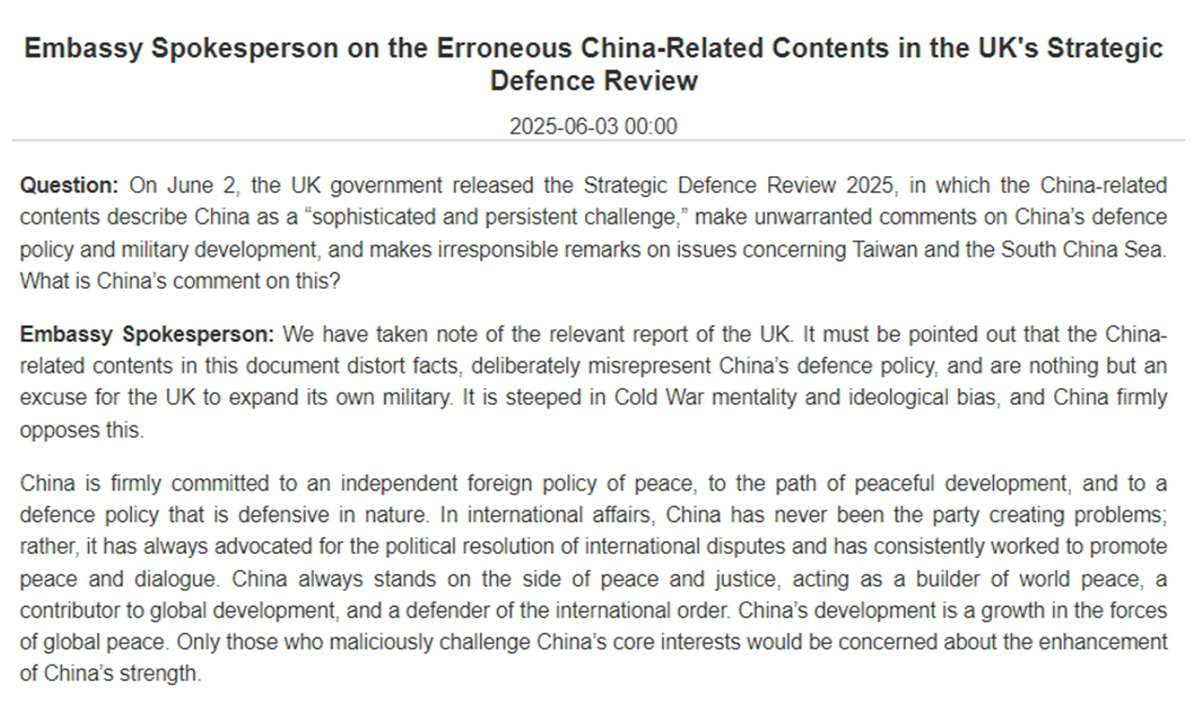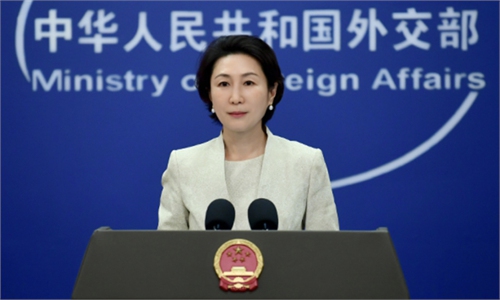UK defence review slammed as misrepresenting China's defense policy; Labour's 'military Keynesianism' faces scrutiny

Chinese Embassy in UK Spokesperson on the Erroneous China-Related Contents in the UK's Strategic Defence Review. Photo: screenshot of website of Chinese embassy in UK
The Chinese Embassy in the UK on Tuesday slammed the UK government's Strategic Defence Review 2025 as "steeped in Cold War mentality and ideological bias," after the report's China-related contents claimed China to be a "sophisticated and persistent challenge," made unwarranted comments on China's defence policy and military development, and made irresponsible remarks on issues concerning Taiwan and the South China Sea, according to the embassy's official website.
The 140-page Strategic Defence Review (SDR), published late on Monday afternoon, claims that Britain faces "multiple, direct threats" to its own security for the first time since the end of the cold war - and that to deter conflict the UK must be "ready to fight and win."
The SDR, carried out by former Labour Defence Sectary Lord Robertson, claimed that "China is a sophisticated and persistent challenge", and "likely to continue seeking advantage through espionage and cyber attacks."
Commenting on the SDR, an opinion piece published in the Guardian was headlined "Labour pushes 'military Keynesianism' to win support for defense spending."
The Guardian said the UK government wants to win support for this increased militarization by arguing that investment in defense helps create skilled jobs, particularly outside London, such as at shipyards in Barrow, Devonport, Glasgow and Rosyth. This "military Keynesianism" was emphasized on Sunday morning when ministers announced plans to build six new munitions factories, which would in time create 1,000 jobs and support a further 800, the Ministry of Defense said, per the report.
"While the concept of the Labour government to promote the UK's defense strategy through 'military Keynesianism,' framing increased military spending as a defense dividend appears ambitious in scope, it faces significant misunderstandings and practical implementation challenges," Li Guanjie, a research fellow with the Shanghai Academy of Global Governance and Area Studies under the Shanghai International Studies University, told the Global Times.
The review continues the overall thinking of the previous government in dealing with changes in the world pattern in the past, that is, hyping external threats, attempting to seek hostile forces in the UK, and alleging to enhance military strength to ensure the security of the UK, Li said.
This type of rhetoric against China is also a move to align with US strategic interests, Gao said, adding that frequently using China as a talking point and stirring up confrontation will not solve the UK's own problems.
The Guardian report has also doubted how the government will fund Starmer's "ambition" to spend 3 percent of gross domestic product on defense in the next parliament. The prime minister argued defense had to be prioritized above other public services.
A BBC report raised the question that the Strategic Defence Review states it will make defense "an engine for growth across the UK." But is that feasible? It wrote.
The outcome of Starmer's massive investment in defense may simply lead to more arms exports. Military equipment are consumables, so how can they genuinely stimulate the economy? This reveals the inherent contradiction of military Keynesianism, Li told the Global Times.
The Chinese embassy in UK said on Tuesday it must be pointed out that the China-related contents in this document distort facts, deliberately misrepresent China's defence policy, and are nothing but an excuse for the UK to expand its own military.
China is firmly committed to an independent foreign policy of peace, to the path of peaceful development, and to a defence policy that is defensive in nature. In international affairs, China has never been the party creating problems; rather, it has always advocated for the political resolution of international disputes and has consistently worked to promote peace and dialogue, the spokesperson said.
While distorting China as a challenge, some politicians in the UK clearly understand that it is not beneficial to the UK itself to engage in any extreme confrontation with China, Gao Jian, director of the Center for British Studies at Shanghai International Studies University, told the Global Times on Tuesday.




